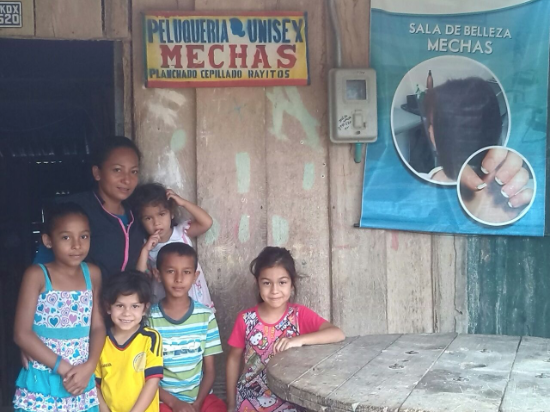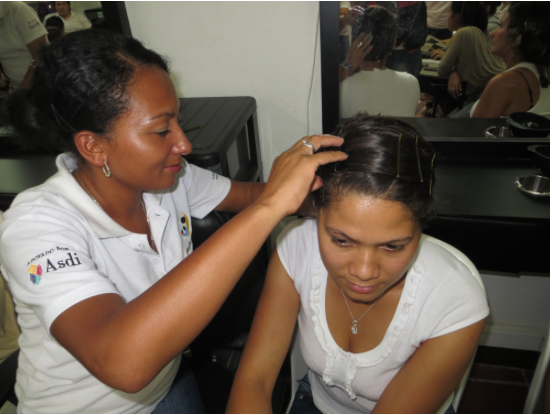
In December 2002, the family arrived to the Colombian municipality Convención to start a new life. But only seven years had passed when, in 2009, illegal armed groups tried to kidnap Maria´s 14 year old daughter. Dreading the situation, Maria saw no other solution then to flee again with her children. This time the family was displaced to the town of Ocaña.
No safe place
When they reached Ocaña, the family had left behind all of their belongings and they were without food, water or energy. Memories of the displacement would often come back and remind Maria of her painful past. She recalled the faces of the hundreds of people that had been displaced along with her and remembered the anguish she felt when armed men asked her to give up her eldest daughter.
“Waking up in the mornings was not easy. No place seemed safe, after the second displacement, the hope of leading a normal life vanished”, Maria says.

Maria together with her children. Photo: NRC/Jorge Ramirez
In Ocaña, Maria had to turn to begging on the streets for the survival of herself and her family. Luckily, a friend of her mother’s prepared a room and a couple of mats for them to sleep on. “We were lucky to find a lady that lent us a hand. My mom met her in El Carmen before our second displacement”.
Education leading the way to a new start
After two years, Maria managed to get a job as a maid cleaning houses. “It is necessary to weep in sadness so we can value happiness. I will never forget our suffering, but my children do not deserve a woman that grieves everyday”.
In 2010 Maria was enrolled in NRC’s education program to complete her high school education. Two years later, she received her high school diploma. “I do believe that education leads the way forward. Since 2012 I have tried convincing every person I meet to finish their studies”. During the two successive years, Maria was able to join a technical course as a beautician.
After she completed her studies as a hairdresser, confident in her capacities, Maria started cutting the hair of her neighbours in her own home. She arranged her humble house made of timber, with a chair to sit in and tended to her clients. After a while, the rumours of her good work reached a prestigious hair saloon in the city which eventually hired her.

Maria dreams of opening her own hair saloon one day. Photo: NRC/Jorge Ramirez
A role model
Today Maria is still working as a hairdresser and splits the profits equally with the owner of the saloon. “Life must be fair”, says Maria, “displaced people like us deserve to grow as persons and thrive.
Maria is only one of 6 million displaced people that have fled the conflict in Colombia, where more than 60% live in a condition of poverty and 33% in one of extreme poverty.
The strong woman is aware that people in her neighbourhood are living under poor conditions that is why she believes that the current peace negotiations will be important for the country in general and the victims of the conflict in particular. Maria also believes that the commitment to peace must also be individual, “peace is not signed between the government and the guerrilla, peace must be singed in the heart of each one of us that lived this violence”.
Maria is dedicated to helping others to cleanse their hearts while at the same time being an active model for her community and working for her dreams: “I want to have my own hair saloon. That is my main dream. Managing to have a calm life and providing better education to my children is something I yearn”.



